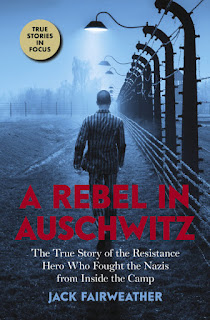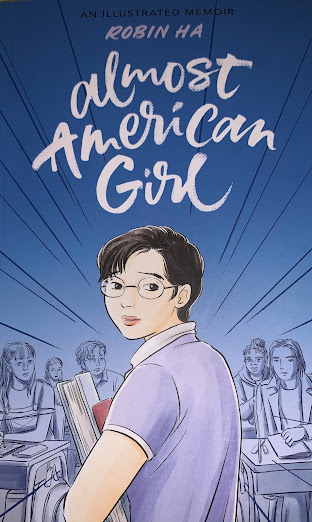A Rebel in Auschwitz
A Rebel in Auschwitz by Jack Fairweather
Reviewed by A. Najera, E. Munoz, A. Perez, K. Preciado
Review:
“A Rebel in Auschwitz” by Jack Fairweather tells the deeply moving story of Witold Pilecki, a Polish officer who becomes a hero of the Holocaust by voluntarily infiltrating Auschwitz to gather intelligence and document the war crimes that are unfolding within the camp. Pilecki’s actions are a testament to human courage in the face of adversity. Fairweather consistently illuminates the horrors of Auschwitz and the profound trauma that prisoners experienced throughout their stay at the camp.
This book, if chosen as a part of a lesson plan can encourage a students understanding of the Holocaust; through a different lens than what's commonly placed in front of them, that is a third person perspective. Due to the third person narration, it engages the reader more into imagining the whole story rather than the limiting perspective of first person. It forces the reader to think more critically about how significant his choice was, due to his extending sympathy for people outside his close societal circle. Not only that, but it also allows the reader the space to be able to digest as horrific as a story as this, and still understand its significance. That is, they are not put into this first person perspective of the events that happened and are not overwhelmed with overpowering circumstances that can mislead the reader's focus to the whole point of such a story.
The photos displayed within the novel fortified the credibility of the text, which bolsters the significance of the unheard story. What's more is that this addition of images also added to the reader’s ability to have a personal connection to the unraveling account by Pilecki. Not only does it make the story ruminate with earnestness but it also implicates the idea that despite how horrid conditions may be, an agreement to rise against it, shall never be impossible.
Furthermore, because of the fluidity the story has, the readers are able to connect vital parts of the narrative to specific characters, which in turn increases their chances of memorizing the critical events as described within the text. Being able to read about such a horrific event through a book as such allows for the story’s importance to be upheld through this outlet to be heard and listened to. Another importance that upheld was the fact that its narration allowed for the reader to have an easier time to digest the cruel events that took place; it isn’t too overbearing and is easier to understand. Due to the third person narration, it engages the reader more into imagining the whole story rather than the limiting perspective of first person.
The keyword trauma permeates every page of the book, as Fairweather navigates the psychological and emotional toll inflicted by the Holocaust. Pilecki's firsthand account exposes the dehumanizing conditions, the daily atrocities, and the systematic violence that defined life in Auschwitz. The trauma inflicted upon the prisoners, both physically and psychologically, is vividly depicted, providing readers with a visceral understanding of the unimaginable suffering endured by those trapped within the confines of the camp.
Biography:
Jack Fairweather, a 45 year old man, born in Shrewsbury England in 1978 is a writer and war correspondent who worked with The Daily Telegraph to cover Baghdad, and then in Iraq during the invasion of Iraq of 2003 for the New York Times. He also managed to survive an attempted kidnapping and a suicide bombing during his time as a war correspondent. While in Baghdad he met his wife and now lives a quiet life writing history books while raising three daughters in Whales. Due to his interest in history he began researching Witold Pilecki’s remarkable story for at least 5 years and had two research stations in Poland where he would frequently visit. He had three other researchers working alongside himself. Fairweather was so remarkably touched by Pilecki’s story he had made the decision to write about his historical account because it was so unknown to the world for so long.
Instructional Resources:
1.The National Archives UK - The Holocaust: This website is the National Archives from the United Kingdom which holds many files from history and cultures from around the world. You can use this link to explore different records of the Holocaust that will be helpful and insightful to connect to the novel A Rebel in Auschwitz.2.The Museum of Tolerance: This website leads to the Museum of Tolerance that is located in Los Angeles. The museum’s goal is to have those who visit it understand the ideas of Ignorance, discrimination and the holocaust in a more contemporary way through interactive activities and events. You can use this website to buy tickets to visit the museum and also search through the website for any events or exhibits that you may want to visit to connect with the Novel we are reading.
3. Auschwitz Memorial and Museum: This website leads to the Memorial and Museum of Auschwitz that is located in Oświęcim Poland. This website holds information about the notorious concentration camp and contains different articles of what happened within Auschwitz. You can also plan a trip to visit the camp to learn more about the history in person. You can use this website to learn about Auschwitz through their website and articles that can be helpful in understanding more of this tragedy.
4.United States Holocaust Memorial Museum: This website leads to the United States Holocaust Memorial Museum which is located in Washington DC. You can use this website to learn more about the tragedy of the Holocaust and also see if there are any events that the museum might have. They also have many good videos and resources that one can use as well as buy tickets to visit the museum.
5.Why This Soldier actually Volunteered for Auschwitz: This video summarizes who Witold Pilecki and the mission he took on. This video provides a lighter way of summarizing the events that Witold Pilecki had to go through and also gives a base to build upon while working on their assignment.
7. History: Lida: With a brief history about the city of
Lida, students can better understand the text. Such information gives further
insight about the historical aspects where the personal narrative (A Rebel in
Auschwitz) took place. This one-minute read will serve to reiterate the borders
surrounding Lida and other associated facts.
8. Nazi Concentration Camp: Auschwitz: An overview of the
lives at Auschwitz are accounted for in this article. Music and its place in
the camp are discussed. The purpose for an orchestra is detailed as are the
emotional pressures musicians experienced during this 1940 period. A more
detailed summary of “Official Camp Orchestras in Auschwitz” can be found
on this website. Incorporating music into a lesson plan can help keep students
interested but more so can enhance a student’s learning experience. The guards
and the purpose for having bands is discussed in this article.
9. Elie Wiesel: A Witness: Holocaust education can be a
tough task. Understanding the complexities of teaching historical facts and
including the personal narrative can better prepare educators for the
classroom. This eight-minute video aids in showing the memoir’s purpose, in
both a literary and historical context.
10. Times: Final Account Movie Review: In this movie
review, Nazi soldiers and the generations following them are addressed about
their involvement and connection to the Holocaust. Luke Holland, a documentary
filmmaker, set out to find answers about his family’s history but unfortunately
was unable to finish compiling his 250 interviews into a movie as he died of
cancer in June 2020. The movie was picked up and finished by other filmmakers.
Final Account was released on May 21, 2021. This movie review in the Times
discusses the documentary, stating its use as a teaching tool is “invaluable”.
11. Testimony: Postwar Survivor: In this video, trauma is
addressed and the resilience of a Holocaust survivor is shared. With
testimonies, the uniqueness of experience and the individual, educators will be
provided with a greater understanding of sensitivity for the subject. On
this same site, songs from the Holocaust can found. The following link
provides English translated lyrics to the song, “MINUTN FUN BITOKHN!” composed and written by Mordecai
Gebirtig. Teachers and students can also access an audio file of the song
directly from the website.
Instructional Activity:
Preview: Students will be able to identify the main ideas and key concepts within the text by listing main characters and sequencing events using Freytag's pyramid. Students will complete a pre-quiz regarding the visuals within the text to understand the primary and secondary sources given within the text. Lastly, students will demonstrate critical thinking by discussing important historical elements of the book in small groups and as a class.
1. (Reading Standards for Literacy in History/Social Studies 6–12
Key Ideas and Detail 1.) Cite specific textual evidence to support the analysis
of primary and secondary sources. of primary and secondary sources, attending
primary and secondary sources, connecting insights to such features as the date
and origin of the information (pg.87)
2. (Reading Standards for Literacy in History/Social Studies 6–12 Craft and Structure 5.)
Analyze how a text uses structure to emphasize key points or advance an
explanation or analysis (pg.87)
3. (Writing Standards for Literacy in History/Social Studies, Science, and Technical
Subjects 6–12 Production and Distribution of Writing 5.) Develop and strengthen
writing as needed by planning, revising, editing, rewrite, or trying a new
approach, focusing on addressing what is most significant for a specific
purpose and audience. (pg.86)
4. (Reading Standards for Literacy in History/Social Studies 6–12 Craft and Structure 6.)
Compare the point of view of two or more authors for how they treat the same or
similar topics, including which details they include and emphasize in their
respective accounts. (pg.81)
https://docs.google.com/document/d/1XKXOxLqaAaFohtPARBkgyQglQuMsHLeVBUNTMH5znAA/edit?usp=sharing
Instructional Plan:
1. A pre-quiz
will be given to the students. Before engaging with the text (A Rebel in Auschwitz), students will analyze the visuals incorporated in
the secondary source. They will independently respond to the prompt.
2. Students will be given a handout to complete independently (15-20
minutes)
3. Students will then be broken up into groups of (4-5) comparing and
contrasting answers
a. What did students agree/ disagree on?
4. As a class, discuss questions 3 and 4 of the handout
5. Handout “Writing Activity: Moments
Bibliography
Auschwitz. ORT, holocaustmusic.ort.org/places/camps/death-camps/auschwitz/.
Accessed 5 Dec. 2023.
Britannica, The Editors of Encyclopaedia. "Lida". Encyclopedia Britannica, 3 Jun. 2010, https://www.britannica.com/place/Lida. Accessed 17 November 2023
Diaz, Alexander. "Author of a Rebel in Auschwitz, Jack Fairweather, Speaks with WHSAD, 5 Sept. 2023, www.whsad.org/the-column/ author-of-a-rebel-in-auschwitz-jack- fairweathr-spaks-with whsad-students.
DKAmedia. “Interview with Jack Fairweather, the Author of the Awarded Book about Witold Pilecki.” BritishPoles.Uk, 13 Feb. 2020, www.britishpoles.uk/interview-with-jack- fairweather-the-author-of-the-awarded-book-about-witold-pilecki/. Accessed 11 Dec. 2023.
Library of Congress, and U.S Veterans History Project. "Holocaust Cantata: Songs from the Camps". Washington, D.C.: Library of Congress, -11-15, 2005. Video. Retrieved
“The Volunteer: An Interview with Jack Fairweather - Instytut Pileckiego.” Strona Główna - Instytut Pileckiego, instytutpileckiego.pl/en/kolekcje-cyfrowe/mediateka/koleje-losu- rotmistrza-rozmowa-z-jackiem-fairweatherem.
Google Search, Google, www.google.com/search?q=a%2Brebel%2Bin%2Bauschwitz&sca_esv=590197046&rlz=1C1GCEA_enUS1076US1076&tbm=isch&sxsrf=AM9HkKnaDYkfaOGzP2KcLhqmwjJCdb-uTw%3A1702398526024&source=lnms&sa=X&ved=2ahUKEwiEoaPbqIqDAxWiJ0QIHbgTBOcQ_AUoAXoECAMQAw&biw=1280&bih=571&dpr=1.5#imgrc=YxJJXGGh4nuolM. Accessed 12 Dec. 2023.
United States Holocaust Museum. “Bearing Witness: Elie Wiesel and Night.” YouTube, YouTube, 11 July 2022, www.youtube.com/watch?v=6pHg6VWpA6M.


